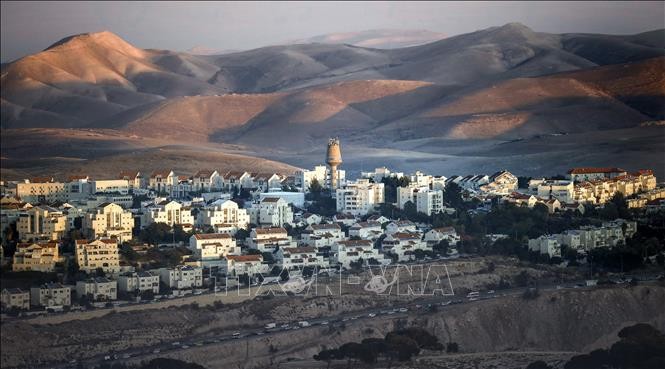(VOVWORLD) - The Middle East is heating up with tensions over Israel’s plan to annex parts of the West Bank. A new spike in violence is likely if the annexation plan is carried out.
 Israel's Maale Adumim settlement in West Jerusalem. (photo: AFP/VNA) Israel's Maale Adumim settlement in West Jerusalem. (photo: AFP/VNA) |
Thousands of Israelis gathered Wednesday at Rabin Square in Tel Aviv to protest Prime Minister Benjamin Netanyahu’s plan to expand Israel’s territory in the West Bank. They carried banners rejecting Israel’s annexation and occupation plans and calling for peace and democracy. Analysts say the demonstrations show that the government’s plans do not represent the wishes of all Israelis, many of whom anticipate a violent reaction from Palestinians and the rest of the Arab world.
Backlash by Palestinians and other Arabs
One day before the demonstration in Tel Aviv, Palestinian envoy to the UN Riyad Mansour said the Palestinian government will step up pressure on the UN Security Council to stop Israel from annexing parts of the West Bank. He will meet the Security Council President and members to elaborate the consequences of Israel’s annexation plan.
Sabri Seidam, a member of the Fatah Central Committee in the West Bank, said Palestinian leaders have held special conferences to discuss countermeasures against Israel’s annexation plan. The Palestinian National Council announced it will scrap all agreements with the US and Israel. It said Israel’s policies and actions show the administration’s clear intention to continue to occupy Palestine’s territory and worsen the situation.
The Arab Peace Initiative, an independent organization of former Presidents, Prime Ministers, and Ministers of Arab countries sent a letter to Arab leaders calling on them to show a united front opposing Israel’s plan.
Jordan’sKing Abdullah II warned that if Israel annexes parts of the West Bank in July, instability and extreme reactions will occur. Such a dangerous move would lead to a “big clash” with Jordan and Jordan would have to reconsider its peace accord with Israel. Jordan was the second Arab country, after Egypt, to sign a peace accord with Israel.
Risk of violence
Warnings of possible violence have been growing since April. The Palestinian government said in May that it will cancel all security agreements and cooperation with Israel, and several Palestinian militias in the West Bank and Gaza, including Hamas and Islamic Jihad, have issued stern warnings that they will do everything they can to stop Israel from carrying out its plan. Jihadist groups in Lebanon, Syria, Iraq, and Libya have expressed support for the Palestinians, saying they will fight side by side with them.
Israel's annexation plan has support from the United States but many in the international community see the Palestinians being pushed into a corner. One Arab analyst says the Palestinians must now fight because the Middle East peace process has been abandoned and there is little indication that Israel wants to resume it any time soon.